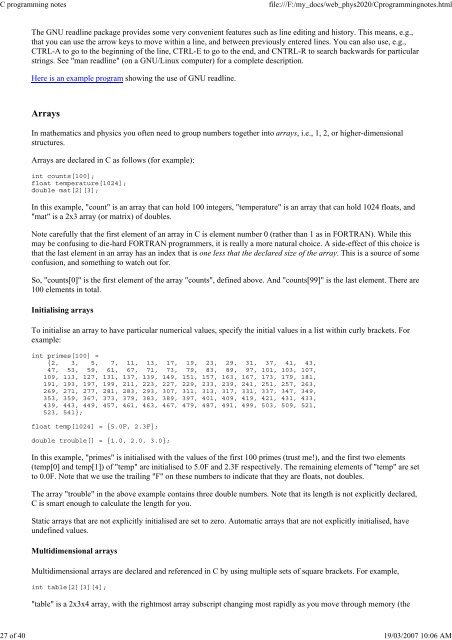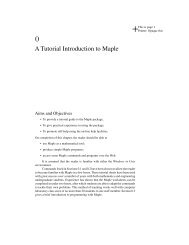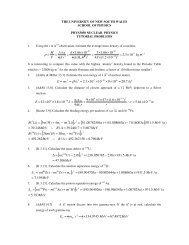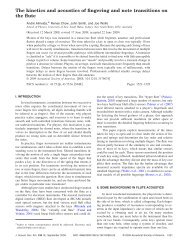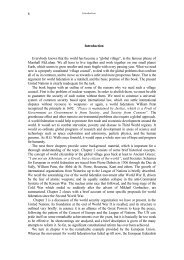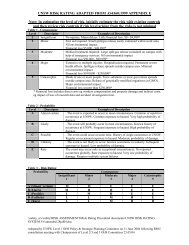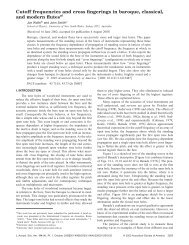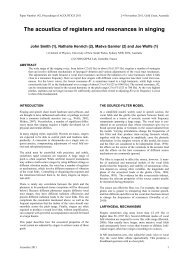C programming notes - School of Physics
C programming notes - School of Physics
C programming notes - School of Physics
Create successful ePaper yourself
Turn your PDF publications into a flip-book with our unique Google optimized e-Paper software.
C <strong>programming</strong> <strong>notes</strong><br />
file:///F:/my_docs/web_phys2020/C<strong>programming</strong><strong>notes</strong>.html<br />
27 <strong>of</strong> 40 19/03/2007 10:06 AM<br />
The GNU readline package provides some very convenient features such as line editing and history. This means, e.g.,<br />
that you can use the arrow keys to move within a line, and between previously entered lines. You can also use, e.g.,<br />
CTRL-A to go to the beginning <strong>of</strong> the line, CTRL-E to go to the end, and CNTRL-R to search backwards for particular<br />
strings. See "man readline" (on a GNU/Linux computer) for a complete description.<br />
Here is an example program showing the use <strong>of</strong> GNU readline.<br />
Arrays<br />
In mathematics and physics you <strong>of</strong>ten need to group numbers together into arrays, i.e., 1, 2, or higher-dimensional<br />
structures.<br />
Arrays are declared in C as follows (for example):<br />
int counts[100];<br />
float temperature[1024];<br />
double mat[2][3];<br />
In this example, "count" is an array that can hold 100 integers, "temperature" is an array that can hold 1024 floats, and<br />
"mat" is a 2x3 array (or matrix) <strong>of</strong> doubles.<br />
Note carefully that the first element <strong>of</strong> an array in C is element number 0 (rather than 1 as in FORTRAN). While this<br />
may be confusing to die-hard FORTRAN programmers, it is really a more natural choice. A side-effect <strong>of</strong> this choice is<br />
that the last element in an array has an index that is one less that the declared size <strong>of</strong> the array. This is a source <strong>of</strong> some<br />
confusion, and something to watch out for.<br />
So, "counts[0]" is the first element <strong>of</strong> the array "counts", defined above. And "counts[99]" is the last element. There are<br />
100 elements in total.<br />
Initialising arrays<br />
To initialise an array to have particular numerical values, specify the initial values in a list within curly brackets. For<br />
example:<br />
int primes[100] =<br />
{2, 3, 5, 7, 11, 13, 17, 19, 23, 29, 31, 37, 41, 43,<br />
47, 53, 59, 61, 67, 71, 73, 79, 83, 89, 97, 101, 103, 107,<br />
109, 113, 127, 131, 137, 139, 149, 151, 157, 163, 167, 173, 179, 181,<br />
191, 193, 197, 199, 211, 223, 227, 229, 233, 239, 241, 251, 257, 263,<br />
269, 271, 277, 281, 283, 293, 307, 311, 313, 317, 331, 337, 347, 349,<br />
353, 359, 367, 373, 379, 383, 389, 397, 401, 409, 419, 421, 431, 433,<br />
439, 443, 449, 457, 461, 463, 467, 479, 487, 491, 499, 503, 509, 521,<br />
523, 541};<br />
float temp[1024] = {5.0F, 2.3F};<br />
double trouble[] = {1.0, 2.0, 3.0};<br />
In this example, "primes" is initialised with the values <strong>of</strong> the first 100 primes (trust me!), and the first two elements<br />
(temp[0] and temp[1]) <strong>of</strong> "temp" are initialised to 5.0F and 2.3F respectively. The remaining elements <strong>of</strong> "temp" are set<br />
to 0.0F. Note that we use the trailing "F" on these numbers to indicate that they are floats, not doubles.<br />
The array "trouble" in the above example contains three double numbers. Note that its length is not explicitly declared,<br />
C is smart enough to calculate the length for you.<br />
Static arrays that are not explicitly initialised are set to zero. Automatic arrays that are not explicitly initialised, have<br />
undefined values.<br />
Multidimensional arrays<br />
Multidimensional arrays are declared and referenced in C by using multiple sets <strong>of</strong> square brackets. For example,<br />
int table[2][3][4];<br />
"table" is a 2x3x4 array, with the rightmost array subscript changing most rapidly as you move through memory (the


